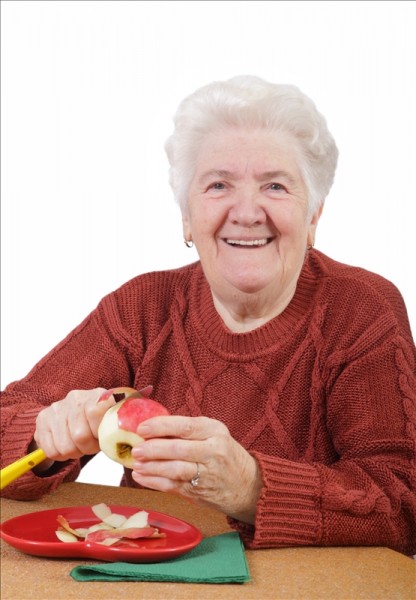Eating nutritious meals is important no matter what stage of life you’re in. In fact, the older we get, the more important the quality of our diet becomes. That’s because as we age, getting adequate amounts of certain nutrients from our food becomes more difficult and the need for calories decreases. In addition, our bodies simply don’t absorb some nutrients as well as they used to.
In general, the nutrients older people are most likely to fall short on are:
- Vitamin B12
- Calcium
- Vitamin D
- Potassium
How to get your nutrients — add variety!
Registered dietitian Kitty Broihier, a member of the Maine Academy of Nutrition and Dietetics, has some important tips. “One of the best ways to avoid shortfalls of these nutrients,” she says, ” is to eat a varied diet. If you eat the same thing every day you’re less likely to have a well-rounded nutrient intake. Mix it up a little!”
Do you peel a banana for breakfast every morning? Why not have a pear, orange, some melon or berries once in a while? And try choosing different types of protein foods. “Chicken is great,” says Kitty, “but what about pork, eggs, fish and shellfish, nuts, beans, and dairy products?”
What you eat becomes more important than how much
If you’re eating less than you used to, then what you DO put into your mouth becomes more crucial nutritionally, says Kitty. “It’s a concept called nutrient density,” she explains. “The basic idea is getting the most nutritional ‘bang for your buck.’ A smaller appetite doesn’t mean your nutritional needs have lessened. Eating a varied diet full of nutritious foods is the way to go. Filling up on foods with low nutritional value, such as pastries, candies or chips will ‘use up’ your appetite but not give you the nutrients you need for good health.”
We need water
Water is another essential nutrient. “Getting enough water helps keep our body’s plumbing working well,” Kitty says. “It also keeps skin healthy, helps us regulate body temperature and generally helps with all the work going on in our bodies that we aren’t even aware is happening in the background.”
Many older people don’t get enough water and end up becoming dehydrated, which can lead to serious health issues. Here are some reasons why older people are at increased risk of dehydration:
- The sensation of thirst decreases with age.
- Medications may act as a diuretic or make you sweat more.
- Kidneys may not function as well.
- Chronic illnesses, such as diabetes, kidney disease, and congestive heart failure can cause or accelerate dehydration.
If you’re concerned that you’re not getting enough, Kitty suggests associating drinking water with something you already do every day. “For example,” she says, “add drinking a glass of water to your morning routine after you brush your teeth, when you take medication in the morning, or before your morning coffee or tea. You could create a new habit — drinking a glass of water with every meal — even having one while you watch the nightly news works!”
She recommends aiming for six glasses a day but check with your doctor first. Sometimes, for other health reasons, it may be necessary to restrict, not increase, your liquids.
What happened to my appetite?
All this advice is well and good but unfortunately, as we age, certain changes may take away our appetites — for food and water.
- Your sense of taste and smell may not be as strong as it used to be and side effects from medications you’re taking can make things worse.
- A dry mouth may make it harder to swallow.
- If you’ve got dentures — a full set or a plate — or are missing teeth, you may not be able to chew certain foods anymore.
- You’re just not that hungry — your physical cues to eat are not strong.
- Overdoing alcohol may prevent your body from absorbing important nutrients.
- You’re on a restricted diet — no more salt, sugar, fat …
- You’re on a fixed income and can’t afford groceries, especially if you also have to buy medications.
- Any number of things, such as grief, loneliness, chronic illness or loss of mobility can lead to depression, which can take away your appetite.
- Poor physical or mental health can make it difficult or impossible to maintain a healthy diet.
Have you lost your appetite?
Have you struggled to cope with changing eating habits? Either yourself or a loved one? Do you have any advice/tips you can share?



So happy to find another Maine blogger. I must admit my appetite has not wavered as I’ve grown older, but alas my metabolism has. Great post. I’ll be checking out more of your writing.
Hi Molly! I just subscribed to your blog and started following you on Twitter. You have a great sense of humor and I love all your pictures. You made me laugh and laugh, but now I need to settle down and start writing something for my own blog! Stay in touch.